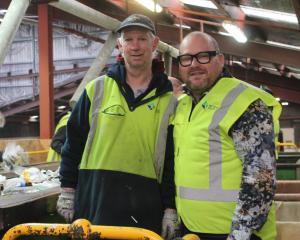While it might sound a lofty dream, the young Dunedin entrepreneur has already achieved a phenomenal amount in the past eight years.
He has turned a teenage notion into a business with a multimillion-dollar turnover - with a little help from some friends.
Language Perfect, winner of the 2007 Audacious Challenge, provides language learning software to secondary school pupils and is now used in about 1000 schools globally.
The story began eight years ago, when Mr Smith, originally from Auckland, was at secondary school himself.
NCEA had just been launched and he was struggling to learn French and Japanese vocabulary. Writing out words on paper was proving inefficient and pronunciation could not be heard.
He developed the first edition of Language Perfect just for himself and his classmates.
On arrival at the University of Otago, he teamed up with his brother Shane Smith, and Scott Cardwell, who is now the company's marketing manager, and turned Language Perfect into a business.
They started selling the software in schools around New Zealand and it was taken up by the ''vast majority'' between 2007 and 2009.
It was also launched in Australia and now, more than 80% of the company's business was offshore, which was ''quite exciting for a little business'' still largely based in New Zealand, Mr Smith, who is chief executive, said.
Last year, school pupils answered 300 million questions on Language Perfect which made it ''one of the most-used educational websites on the planet''. It also held the largest online language competition in the world.
More than 200,000 will compete in this year's competition which begins later this month.
There had been no venture capital investment in the business. Rather, it started with ''a few thousand dollars between us'', Mr Smith said.
Despite admitting that it sounded a little cliched, he believed the one thing that set Language Perfect apart was the ''absolute focus'' on customer service.
If an email was received, often the sender would receive a phone call within a few minutes.
They modelled the business on a five-star restaurant.
''When someone walks in, they need to feel really, really welcome.''
Both Mr Smith and Mr Cardwell attributed their business growth not to conventional marketing, but rather from having happy customers ''that tell their friends about what a great time they've had''.
''If you think of it, if every one of your customers is so happy they tell one friend, you double your business every year. It's not any more complicated than that,'' Mr Smith said.
He said Mr Cardwell was ''quite remarkable'' at understanding how important every tiny interaction was.
Mr Smith was recently chatting to another person involved in the education business, who did not understand how Language Perfect had gained the traction that it had.
''I said, for us, it's all about relationships,'' he said.
Last month, Language Perfect launched a new product, Education Perfect, at a gala event in Federation Square, Melbourne.
Education Perfect is an online programme designed to teach pupils simple concepts across a broad range of subjects, including maths, science, history, English, biology, accounting and enterprise.
The company perceived a gap in the market as many schools had upgraded their online capabilities but did not have the software to support the curriculum. Education Perfect has been picked up by more than 200 schools in the past seven days as part of a free trial, and more than 250,000 questions had been answered already.
There had been a surge towards more online education and schools were increasingly looking for online resources, Mr Smith said.
Language Perfect's dream - ''it sounds a bit corny'' - was to unite the world through education. It also wanted to take learning online ''and almost be like the operating system for online education'', he said.
The rapid growth of the business had been organic and ''every step feels right'', Mr Cardwell said.
''It's grown with us,'' he said.
It now employed about 20 staff full-time and between 60 and 70 part-time.and they described the workplace as ''energetic''.
The focus was on the UK and Australia ''because there's only so much you can focus on'', along with New Zealand, and then other key markets would be targeted, Mr Smith said.












